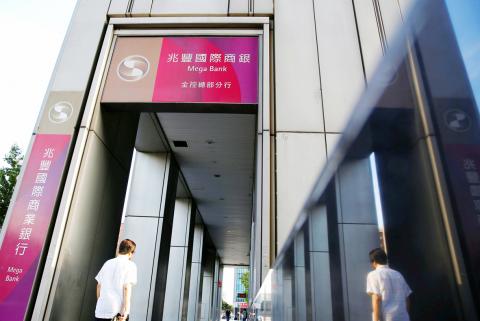The Financial Supervisory Commission (FSC) has summoned former Mega Financial Holding Co (兆豐金控) chairman Mckinney Tsai (蔡友才) for questioning on Sunday, amid allegations that Mega International Commercial Bank’s (兆豐銀行) New York branch might have been involved in money laundering.
FSC Chairman Ding Kung-wha (丁克華) yesterday said that Tsai, who no longer works in the financial sector, could clarify claims that the New York branch was involved in money laundering.
“Tsai has nothing to worry about, as the FSC is not a judicial body and is focused on learning the truth about the case,” Ding said, while speaking at a cooperative education event, which promises to provide 7,000 internship positions at financial firms.

Photo: Tyrone Siu, Reuters
Until Mega Bank resolves the problems associated with the money-laundering allegations, it will be barred from opening any new branches overseas, Ding said.
The commission, which plans to send a delegation to New York and Panama next week to examine Mega Bank’s operations there, yesterday said it respects a decision by the Panamanian government to launch an investigation into the bank, as the Central American country has jurisdiction over banks operating within its territory.
The decision by the Superintendency of Banks of Panama (SBP) to investigate Mega Bank’s branch in Panama came after the New York Department of Financial Services accused Panama of serving as a high-risk jurisdiction for money laundering.
By conducting an investigation into the Mega Bank matter, the SBP is seeking to disprove the department’s allegations and clear Panama’s reputation, FSC Vice Chairman Kuei Hsien-nung (桂先農) said.
Separately, Shin Kong Financial Holding Co (新光金控) yesterday announced that its board of directors had unanimously voted to appoint Catherine Lee (李紀珠) to fill the long-vacant position of president.
Lee is the chairperson of state-run Taiwan Financial Holdings (台灣金控). Her term is to conclude at the end of this month.
Having served as a government official as well as in the banking, securities and insurance sectors, Lee will be tasked with developing new horizons in digital finance, as well as optimizing current operations, Shin Kong said in a statement.
Additional reporting by CNA

Sweeping policy changes under US Secretary of Health and Human Services Robert F. Kennedy Jr are having a chilling effect on vaccine makers as anti-vaccine rhetoric has turned into concrete changes in inoculation schedules and recommendations, investors and executives said. The administration of US President Donald Trump has in the past year upended vaccine recommendations, with the country last month ending its longstanding guidance that all children receive inoculations against flu, hepatitis A and other diseases. The unprecedented changes have led to diminished vaccine usage, hurt the investment case for some biotechs, and created a drag that would likely dent revenues and

Macronix International Co (旺宏), the world’s biggest NOR flash memory supplier, yesterday said it would spend NT$22 billion (US$699.1 million) on capacity expansion this year to increase its production of mid-to-low-density memory chips as the world’s major memorychip suppliers are phasing out the market. The company said its planned capital expenditures are about 11 times higher than the NT$1.8 billion it spent on new facilities and equipment last year. A majority of this year’s outlay would be allocated to step up capacity of multi-level cell (MLC) NAND flash memory chips, which are used in embedded multimedia cards (eMMC), a managed

CULPRITS: Factors that affected the slip included falling global crude oil prices, wait-and-see consumer attitudes due to US tariffs and a different Lunar New Year holiday schedule Taiwan’s retail sales ended a nine-year growth streak last year, slipping 0.2 percent from a year earlier as uncertainty over US tariff policies affected demand for durable goods, data released on Friday by the Ministry of Economic Affairs showed. Last year’s retail sales totaled NT$4.84 trillion (US$153.27 billion), down about NT$9.5 billion, or 0.2 percent, from 2024. Despite the decline, the figure was still the second-highest annual sales total on record. Ministry statistics department deputy head Chen Yu-fang (陳玉芳) said sales of cars, motorcycles and related products, which accounted for 17.4 percent of total retail rales last year, fell NT$68.1 billion, or

In the wake of strong global demand for AI applications, Taiwan’s export-oriented economy accelerated with the composite index of economic indicators flashing the first “red” light in December for one year, indicating the economy is in booming mode, the National Development Council (NDC) said yesterday. Moreover, the index of leading indicators, which gauges the potential state of the economy over the next six months, also moved higher in December amid growing optimism over the outlook, the NDC said. In December, the index of economic indicators rose one point from a month earlier to 38, at the lower end of the “red” light.